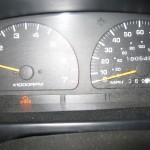You are driving along enjoying the ride and suddenly the “check engine” light comes on and you say to yourself, what do I do now? There is a good chance that the problem is simple and easy to fix but to err on the side of caution is usually best.
Before 1981, the dashboard indicators on cars monitored basic problems, fuel level, oil pressure and the temperature of the engine. In 1981 federal clean air statues were instituted that required catalytic converters on all domestic cars and trucks to help reduce the level of pollutants in the air. The computer that performs this emission system is called an on-board diagnostic (OBD) computer. Then in 1996 the government required automakers to upgrade to OBD II, this is a sophisticated system of sensors that conduct diagnostic emissions tests as you drive. When the OBD II detects a problem, your ” check engine” light goes on and the computer stores a “trouble code” in its memory that identifies the source of the problem. These codes can then be read with an electronic scan tool or a diagnostic computer, which is standard equipment in auto repair shops. Once the codes are read, they direct your repair technician to the source of the problem.
A “check engine” light can signal many different things, something as simple as a loose gas cap to a seriously misfiring engine. So what do you do now? First of all, you should read your owner’s manual and be familiar with your cars gauges and indicator lights and the purpose of each of them. Some lights are yellow to give you a warning, and some are red, meaning a problem needs immediate attention! Know what your dashboard is telling you! Look for indicators of a serious problem that might require quick action. Check the dashboard for indications of low oil pressure or overheating. If either of these conditions exists, pull over and shut off the engine as soon as possible!
If nothing serious is indicated, check your gas cap and make sure it’s tight. Sometimes a loose gas cap can cause the “check engine” light to come on, but the most important thing is don’t ignore it. It doesn’t always mean a big problem or an expensive repair is ahead, but driving with the light on could end up damaging expensive components and causing further damage to your engine. Have your vehicle checked by a trusted mechanic as soon as possible when the light goes on. That way you can avoid any costly repairs and that little “check engine” light has done it’s job!

Leave a Reply
You must be logged in to post a comment.